【BBC六分钟英语】我们为何会痴迷于阴谋论?
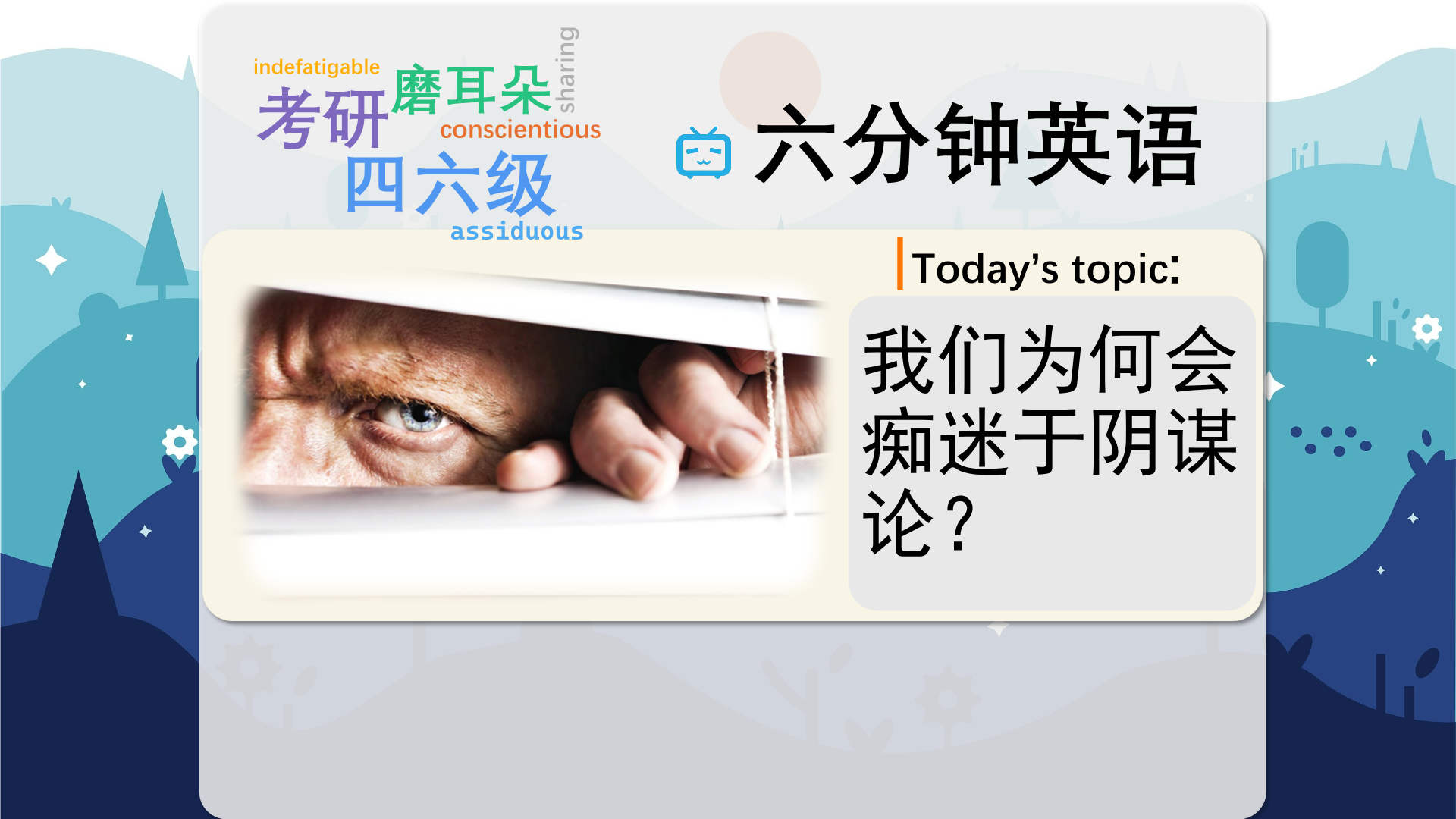
【英文脚本】
Alice
Hello and welcome to 6 Minute English. I’m Alice…
Rob
… And I’m Rob. Alice, I read in the paper recently that the substance called ‘fluoride’ might be bad for our health. But it’s in nearly every brand of toothpaste, isn’t it?
Alice
You shouldn’t believe everything you hear, Rob. Fluoride protects our teeth against decay.
Rob
But there’s a theory that drug companies are using fluoride to affect our brains… and make us all dumb…
Alice
That’s ridiculous Rob!
Rob
Well… I’m not sure if I believe it or not. But it is worrying me.
Alice
Do you also worry that the moon landings never really happened?
Rob
It’s funny you should mention that because… yes! I wonder about this too… Apparently, in the 1960s television footage of the moon landing, the American flag is fluttering, and there’s no air on the moon so the US government must’ve faked it!
Alice
To fake something means to make something that isn’t true appear to be real. I didn’t realize you were so gullible Rob, and that means easily persuaded to believe something.
Rob
I just like to question things.
Alice
Oh, I see…
Rob
I have a healthy distrust of authority, Alice. And today we’re talking about conspiracy theories, a conspiracy theory is a belief that some organization or group of people is responsible for a situation or event through secret planning.
Alice
We’ll talk more about how healthy this type of distrust might be later on in the show. But now please focus your intellectual powers on today’s quiz question, Rob. Around what proportion of the US population believes that the assassination of President John F Kennedy was not the result of a lone gunman? Is it…
a) 6%?
b) 16%? Or c) 60%?
Rob
I’ll go for b) 16%.
Alice
Well, we’ll find out if you chose the right answer later on in the programme. But for now let’s move on. Let’s talk about what types of people are thought to be susceptible to, or likely to be influenced by, conspiracy theories.
Rob
The stereotype is of a loner, maybe male, middle aged, sitting in front of the computer. But in actual fact this isn’t true. People of all ages and from all social classes are susceptible to conspiracy theories. Lots of us worry that important things are being covered up, and a cover-up means an attempt to prevent the public from discovering information about something important.
Alice
Let’s listen now to Professor Chris French from Goldsmiths, a college within the University of London, talking more about people who believe in conspiracy theories.
Chris French, Professor of Psychology at Goldsmiths, University of London
There are quite a few personality dimensions that seem to be related to belief in conspiracy theories and not surprisingly paranoia is one of them; also openness to new ideas, people who are willing to entertain ideas that are kind of off the beaten track. People who believe in conspiracy theories tend to believe in the paranormal.
Rob
That was Professor Chris French. So he says that paranoia is a personality trait, or quality, that leads some people to believe in conspiracy theories.
Alice
Paranoia is a strong and unreasonable feeling that other people don’t like you or want to harm you.
Rob
And ideas that are off the beaten track are those which are unusual and aren’t shared by many other people.
Alice
Believing in the paranormal means believing in strange things that can’t be explained by science, for example, ghosts.
Rob
Ghosts, yes. Do you believe in them, Alice?
Alice
No, Rob, I don’t. How about you?
Rob
Well, maybe.
Alice
Moving on. Most of the time believing in conspiracy theories is quite harmless and might even be good, because we shouldn’t just accept everything that we’re told. But there can also be serious consequences. Let’s hear more from Professor French on this.
Chris French, Professor of Psychology at Goldsmiths, University of London
Studies have shown that people are less likely to engage with the political process. People who accept medically based conspiracies are likely to avoid getting their kids vaccinated. And even terrorist acts, it’s been shown that terrorist groups will actually use conspiracy theories as both a means to get new recruits and also to motivate people to carry out extreme terrorist acts.
Rob
So the toothpaste thing I mentioned at the beginning of the show is a medically based conspiracy theory?
Alice
Yes.
Rob
But more serious examples are parents choosing not to vaccinate their children against diseases because of unsubstantiated ideas that they are harmful, ‘unsubstantiated’ means ‘not supported by evidence’.
Alice
That’s right. OK, now remember the question I asked earlier, Rob? Around what proportion of the US population believes that the assassination of President John F Kennedy wasn’t the result of a lone gunman? Is it… a) 6%, b) 16% or c) 60%?
Rob
Well, I said b) 16%.
Alice
And you were wrong today, Rob, I’m afraid. The answer is actually c) 60%. And this statistic comes from a Gallup poll from 2013 that suggests a clear majority of Americans still believe others, besides the gunman Lee Harvey Oswald, were involved.
Rob
That’s more than I expected. But they might have a point.
Alice
There you go again… Come on, Rob. Now let me remind everybody what words we’ve heard today. They are:
to fake something
gullible conspiracy theory susceptible cover-up trait paranoia off the beaten track paranormal unsubstantiated
Rob
That’s the end of today’s 6 Minute English. Please join us again soon!
Both
Bye.
【中英文双语脚本】
Alice(爱丽丝)
Hello and welcome to 6 Minute English. I’m Alice…
您好,欢迎来到 6 Minute English。我是 Alice…
Rob(罗伯)
… And I’m Rob. Alice, I read in the paper recently that the substance called ‘fluoride’ might be bad for our health. But it’s in nearly every brand of toothpaste, isn’t it?
…我是 罗伯。爱丽丝,我最近在报纸上读到一种叫做“氟化物”的物质可能对我们的健康有害。但几乎每个品牌的牙膏中都有它,不是吗?
Alice(爱丽丝)
You shouldn’t believe everything you hear, Rob. Fluoride protects our teeth against decay.
你不应该相信你听到的一切,罗伯。氟化物保护我们的牙齿免受蛀牙。
Rob(罗伯)
But there’s a theory that drug companies are using fluoride to affect our brains… and make us all dumb…
但有一种理论认为,制药公司正在使用氟化物来影响我们的大脑……让我们都变得愚蠢……
Alice(爱丽丝)
That’s ridiculous Rob!
太荒谬了,罗伯!
Rob(罗伯)
Well… I’m not sure if I believe it or not. But it is worrying me.
井。。。我不确定我信不信。但这让我很担心。
Alice(爱丽丝)
Do you also worry that the moon landings never really happened?
您是否还担心登月从未真正发生过?
Rob(罗伯)
It’s funny you should mention that because… yes! I wonder about this too… Apparently, in the 1960s television footage of the moon landing, the American flag is fluttering, and there’s no air on the moon so the US government must’ve faked it!
你应该提到这一点很有趣,因为……是的!我也想知道这个……显然,在 1960 年代登月的电视镜头中,美国国旗飘扬,月球上没有空气,所以美国政府一定是假的!
Alice(爱丽丝)
To fake something means to make something that isn’t true appear to be real. I didn’t realize you were so gullible Rob, and that means easily persuaded to believe something.
To fake something 的意思是让不真实的东西看起来是真的。我没意识到你是如此容易上当受骗,罗伯,这意味着很容易被说服相信一些东西。
Rob(罗伯)
I just like to question things.
我只是喜欢质疑事物。
Alice(爱丽丝)
Oh, I see…
哦,我明白。。。
Rob(罗伯)
I have a healthy distrust of authority, Alice. And today we’re talking about conspiracy theories, a conspiracy theory is a belief that some organization or group of people is responsible for a situation or event through secret planning.
我对权威有一种健康的不信任,爱丽丝。今天我们谈论的是阴谋论,阴谋论是一种信念,即某个组织或一群人通过秘密策划对某种情况或事件负责。
Alice(爱丽丝)
We’ll talk more about how healthy this type of distrust might be later on in the show. But now please focus your intellectual powers on today’s quiz question, Rob. Around what proportion of the US population believes that the assassination of President John F Kennedy was not the result of a lone gunman? Is it…
我们将在节目后面更多地讨论这种不信任可能有多健康。但是现在请把你的智力集中在今天的测验问题上,罗伯。大约有多少美国人口认为约翰·肯尼迪总统被暗杀不是由一名孤独的枪手造成的?是吗。。。
a) 6%?(a)6%?)
b) 16%? Or c) 60%?
b) 16%?或 c) 60%?
Rob(罗伯)
I’ll go for b) 16%.
我会选择 b) 16%。
Alice(爱丽丝)
Well, we’ll find out if you chose the right answer later on in the programme. But for now let’s move on. Let’s talk about what types of people are thought to be susceptible to, or likely to be influenced by, conspiracy theories.
好吧,我们稍后会发现您是否在节目中选择了正确的答案。但现在让我们继续。让我们谈谈哪些类型的人被认为容易受到阴谋论的影响,或可能受到阴谋论的影响。
Rob(罗伯)
The stereotype is of a loner, maybe male, middle aged, sitting in front of the computer. But in actual fact this isn’t true. People of all ages and from all social classes are susceptible to conspiracy theories. Lots of us worry that important things are being covered up, and a cover-up means an attempt to prevent the public from discovering information about something important.
刻板印象是一个孤独的人,也许是男性,中年人,坐在电脑前。但实际上,事实并非如此。所有年龄段和所有社会阶层的人都容易受到阴谋论的影响。我们很多人都担心重要的事情被掩盖了,而掩盖意味着试图阻止公众发现有关重要事情的信息。
Alice(爱丽丝)
Let’s listen now to Professor Chris French from Goldsmiths, a college within the University of London, talking more about people who believe in conspiracy theories.
现在让我们听听伦敦大学金史密斯学院的 Chris French 教授更多地谈论相信阴谋论的人。
Chris French, Professor of Psychology at Goldsmiths, University of London(ChrisFrench,伦敦大学金史密斯学院心理学教授)
There are quite a few personality dimensions that seem to be related to belief in conspiracy theories and not surprisingly paranoia is one of them; also openness to new ideas, people who are willing to entertain ideas that are kind of off the beaten track. People who believe in conspiracy theories tend to believe in the paranormal.
有相当多的人格维度似乎与对阴谋论的信仰有关,毫不奇怪,偏执狂就是其中之一;此外,他们对新想法持开放态度,愿意接受一些不走寻常路的想法。相信阴谋论的人往往相信超自然现象。
Rob(罗伯)
That was Professor Chris French. So he says that paranoia is a personality trait, or quality, that leads some people to believe in conspiracy theories.
那是克里斯·弗兰奇教授。所以他说,偏执狂是一种人格特征或品质,导致一些人相信阴谋论。
Alice(爱丽丝)
Paranoia is a strong and unreasonable feeling that other people don’t like you or want to harm you.
偏执狂是一种强烈且不合理的感觉,认为其他人不喜欢你或想伤害你。
Rob(罗伯)
And ideas that are off the beaten track are those which are unusual and aren’t shared by many other people.
而那些不走寻常路的想法是那些不寻常的,没有被很多人分享的想法。
Alice(爱丽丝)
Believing in the paranormal means believing in strange things that can’t be explained by science, for example, ghosts.
相信超自然现象意味着相信科学无法解释的奇怪事物,例如鬼魂。
Rob(罗伯)
Ghosts, yes. Do you believe in them, Alice?
鬼魂,是的。你相信他们吗,爱丽丝?
Alice(爱丽丝)
No, Rob, I don’t. How about you?
不,罗伯,我不知道。你怎么样?
Rob(罗伯)
Well, maybe.
嗯,也许吧。
Alice(爱丽丝)
Moving on. Most of the time believing in conspiracy theories is quite harmless and might even be good, because we shouldn’t just accept everything that we’re told. But there can also be serious consequences. Let’s hear more from Professor French on this.
继续。大多数时候,相信阴谋论是无害的,甚至可能是好的,因为我们不应该只接受我们被告知的一切。但也可能有严重的后果。让我们听听 French 教授对此的更多意见。
Chris French, Professor of Psychology at Goldsmiths, University of London(ChrisFrench,伦敦大学金史密斯学院心理学教授)
Studies have shown that people are less likely to engage with the political process. People who accept medically based conspiracies are likely to avoid getting their kids vaccinated. And even terrorist acts, it’s been shown that terrorist groups will actually use conspiracy theories as both a means to get new recruits and also to motivate people to carry out extreme terrorist acts.
研究表明,人们不太可能参与政治进程。接受基于医学的阴谋论的人可能会避免让他们的孩子接种疫苗。即使是恐怖主义行为,事实证明,恐怖组织实际上会利用阴谋论作为招募新成员的手段,同时也会激励人们实施极端的恐怖主义行为。
Rob(罗伯)
So the toothpaste thing I mentioned at the beginning of the show is a medically based conspiracy theory?
所以我在节目一开始提到的牙膏是以医学为基础的阴谋论吗?
Alice(爱丽丝)
Yes.
是的。
Rob(罗伯)
But more serious examples are parents choosing not to vaccinate their children against diseases because of unsubstantiated ideas that they are harmful, ‘unsubstantiated’ means ‘not supported by evidence’.
但更严重的例子是父母选择不给孩子接种疫苗,因为未经证实的想法认为它们是有害的,“未经证实”意味着“没有证据支持”。
Alice(爱丽丝)
That’s right. OK, now remember the question I asked earlier, Rob? Around what proportion of the US population believes that the assassination of President John F Kennedy wasn’t the result of a lone gunman? Is it… a) 6%, b) 16% or c) 60%?
没错。好了,现在还记得我之前问的问题吗,罗伯?大约有多少美国人口认为约翰·肯尼迪总统被暗杀不是由一名孤独的枪手造成的?是吗。。。a) 6%, b) 16% 还是 c) 60%?
Rob(罗伯)
Well, I said b) 16%.
嗯,我说的是 b) 16%。
Alice(爱丽丝)
And you were wrong today, Rob, I’m afraid. The answer is actually c) 60%. And this statistic comes from a Gallup poll from 2013 that suggests a clear majority of Americans still believe others, besides the gunman Lee Harvey Oswald, were involved.
而你今天错了,罗伯,恐怕。答案实际上是 c) 60%。这一统计数据来自 2013 年盖洛普民意调查,该民意调查表明,除了枪手李·哈维·奥斯瓦尔德 (Lee Harvey Oswald) 之外,绝大多数美国人仍然认为其他人参与了其中。
Rob(罗伯)
That’s more than I expected. But they might have a point.
这比我预期的要多。但他们可能有道理。
Alice(爱丽丝)
There you go again… Come on, Rob. Now let me remind everybody what words we’ve heard today. They are:
你又来了……来吧,罗伯。现在让我提醒大家我们今天听到了什么话。他们是:
to fake something(假装什么)
gullible conspiracy theory susceptible cover-up trait paranoia off the beaten track paranormal unsubstantiated
易受骗 阴谋论 易感 掩盖特质 偏执狂 人迹罕至之处 超自然现象 未经证实
Rob(罗伯)
That’s the end of today’s 6 Minute English. Please join us again soon!
今天的六分钟 English 到此结束。请尽快再次加入我们!
Both(双)
Bye.
再见。

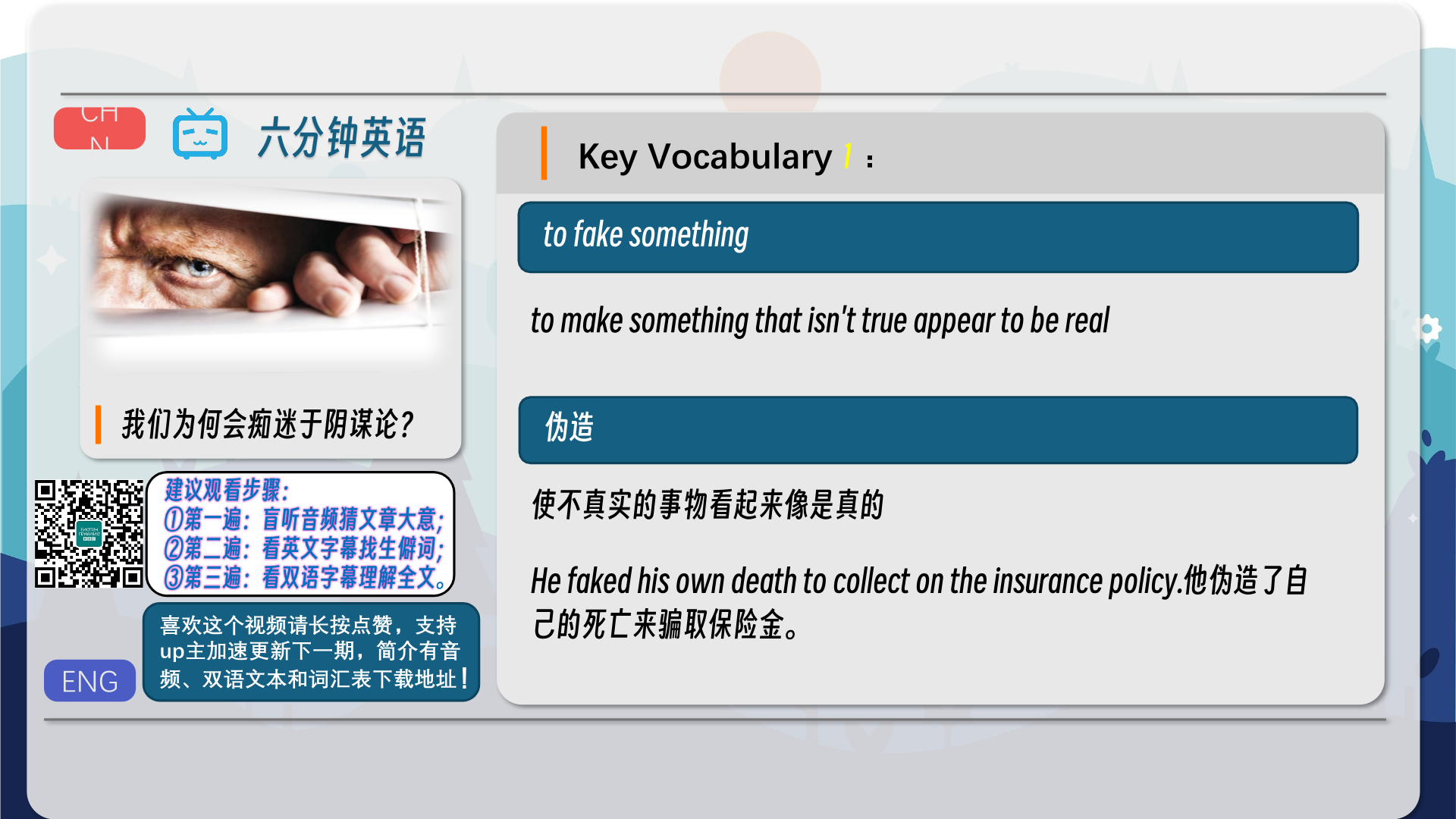
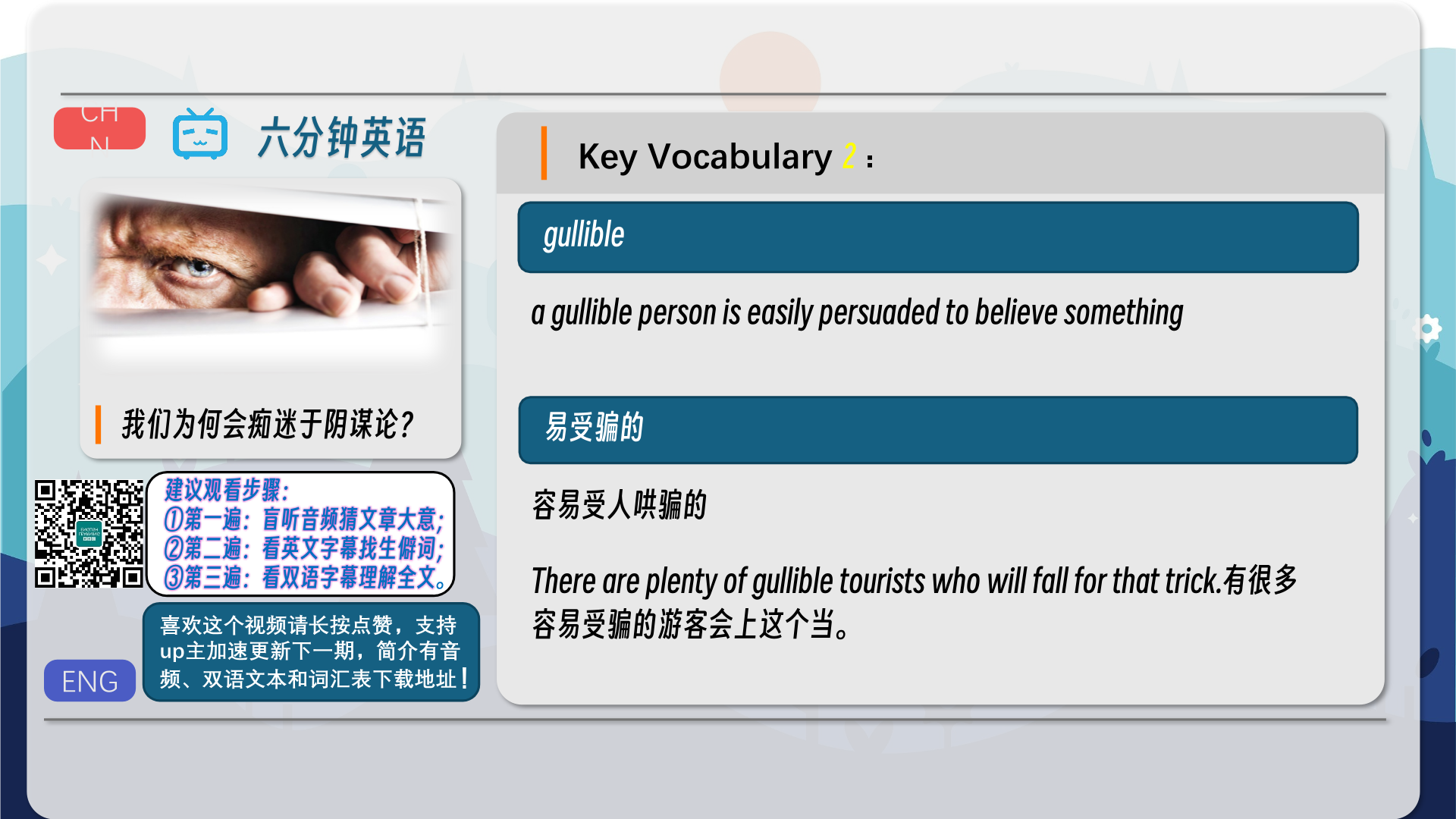
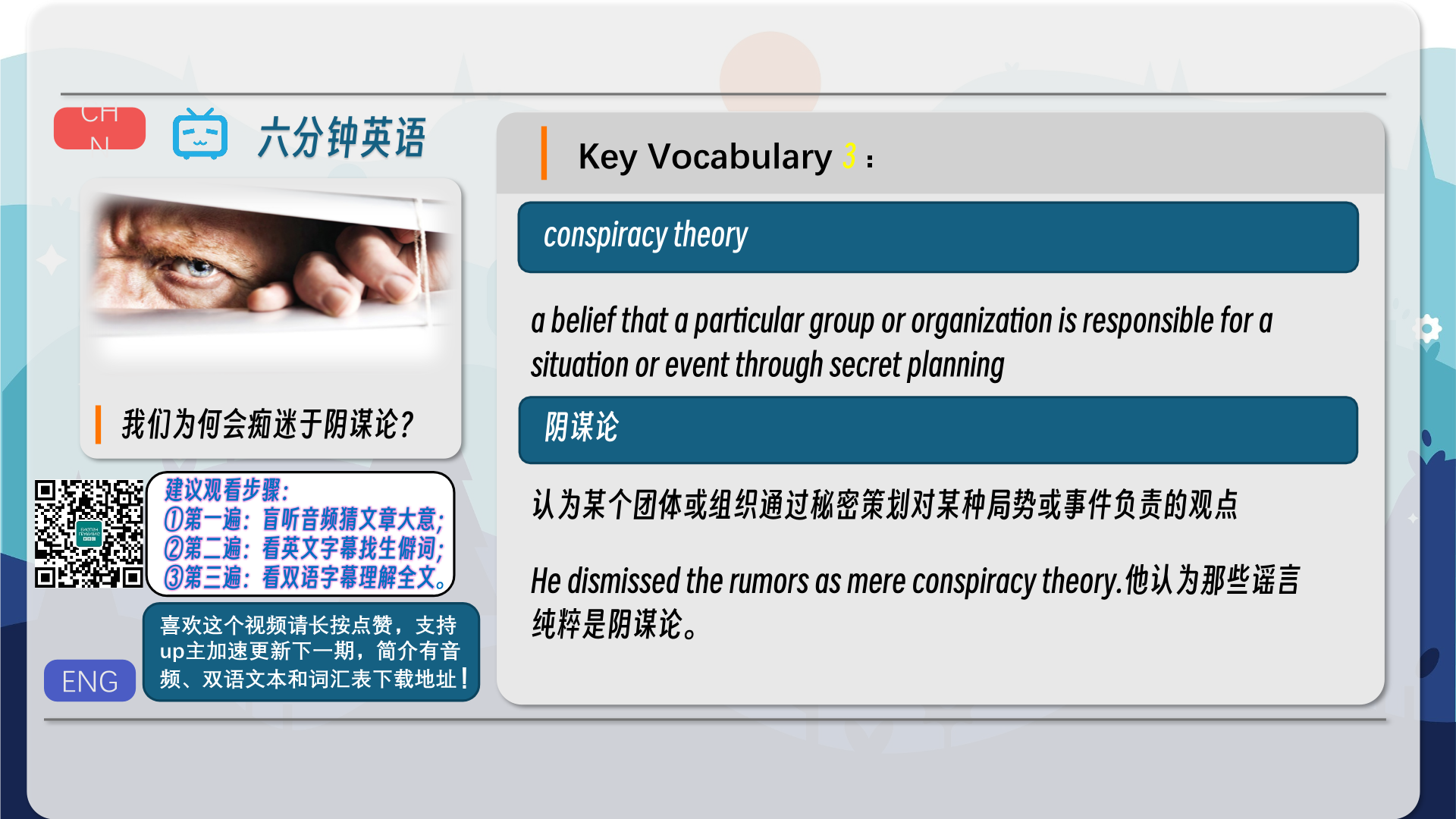
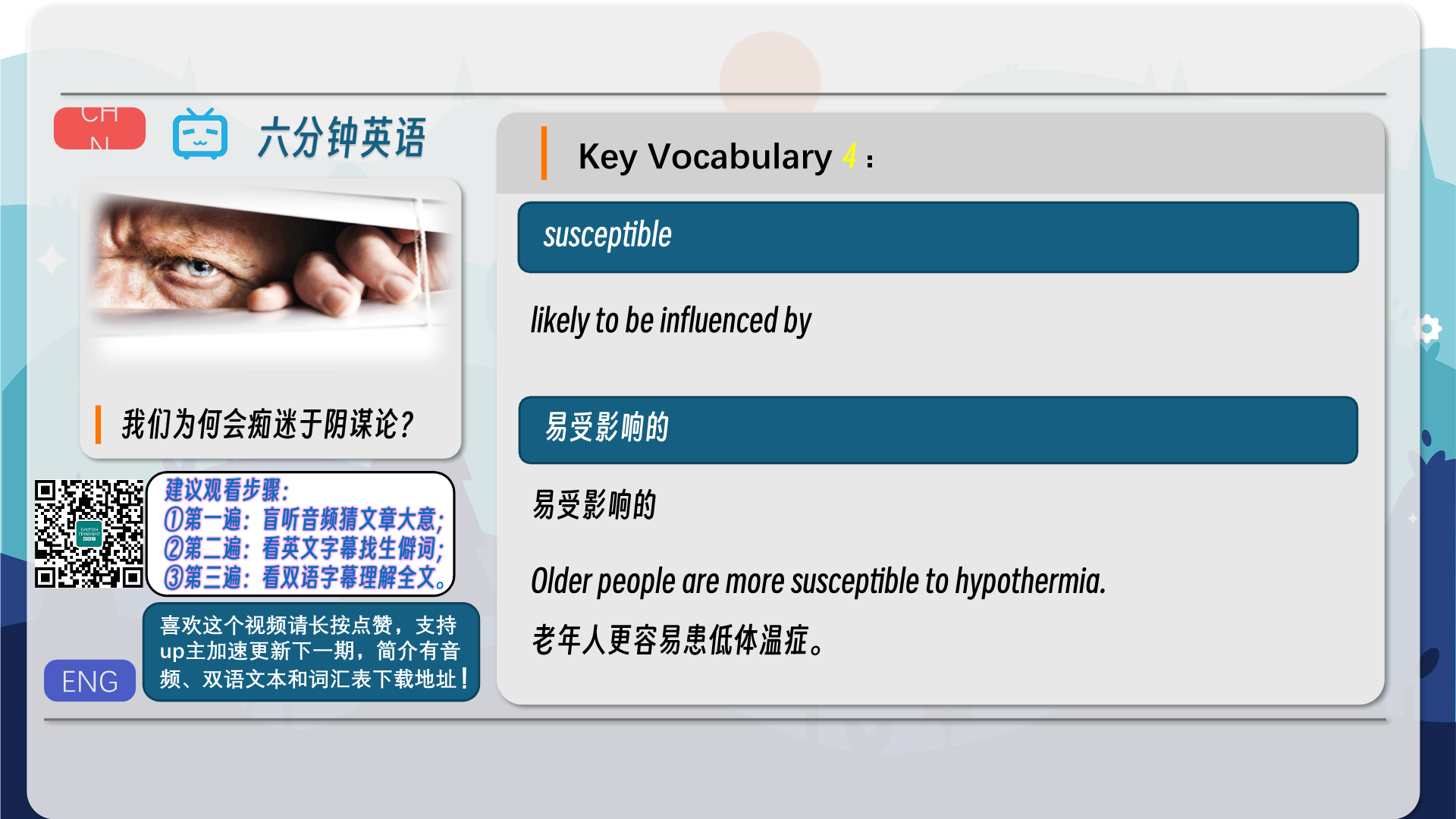
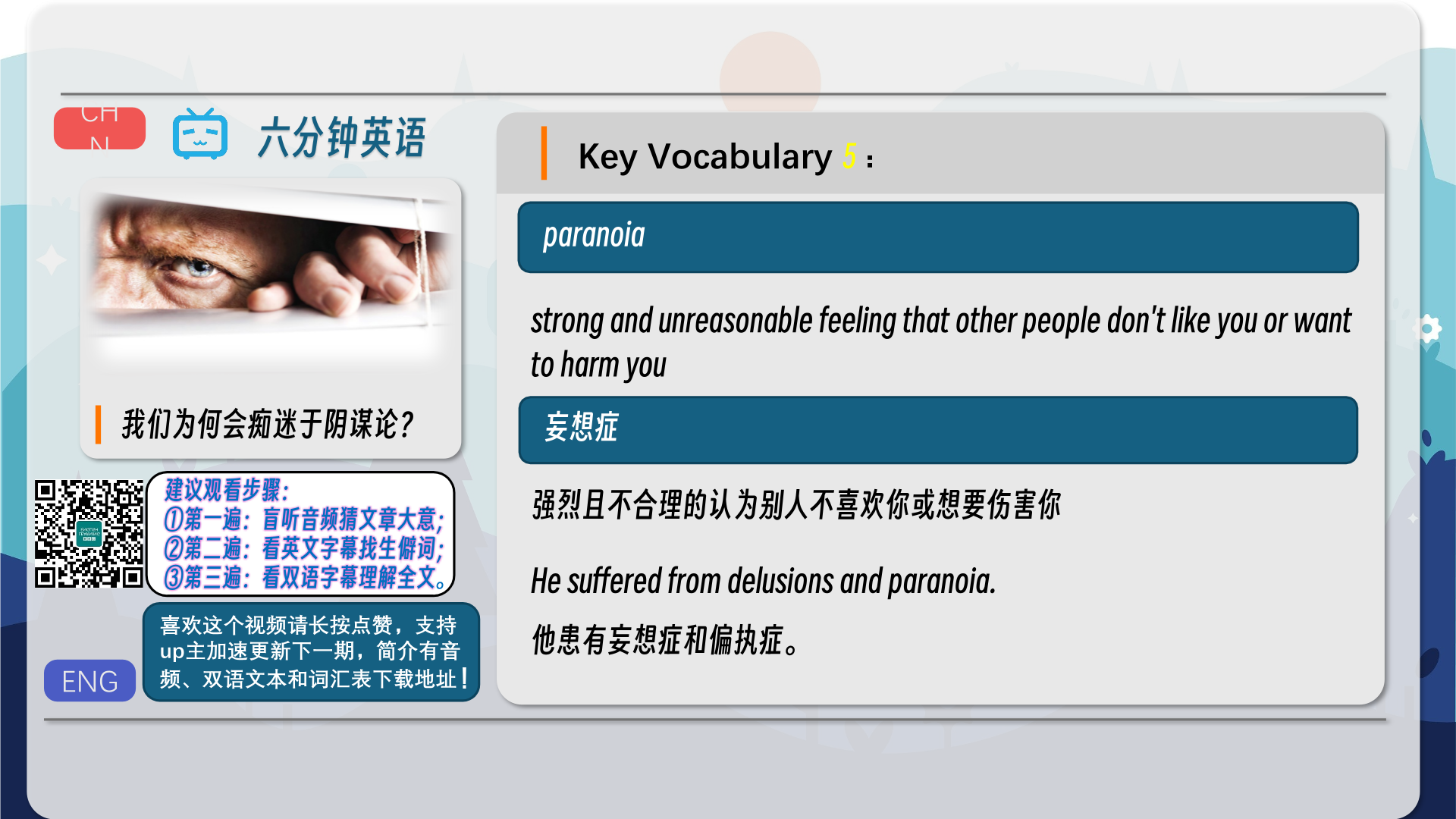
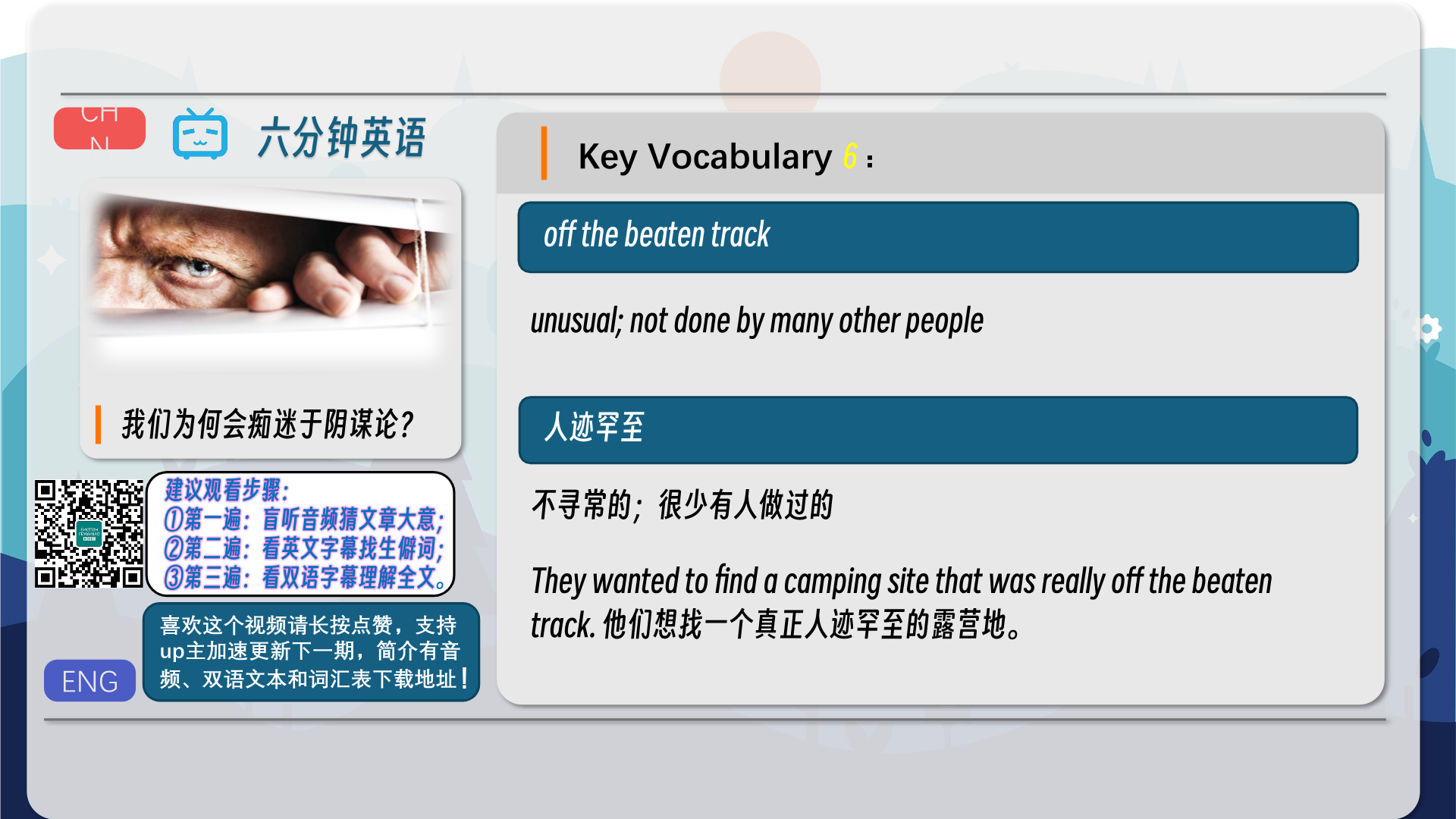
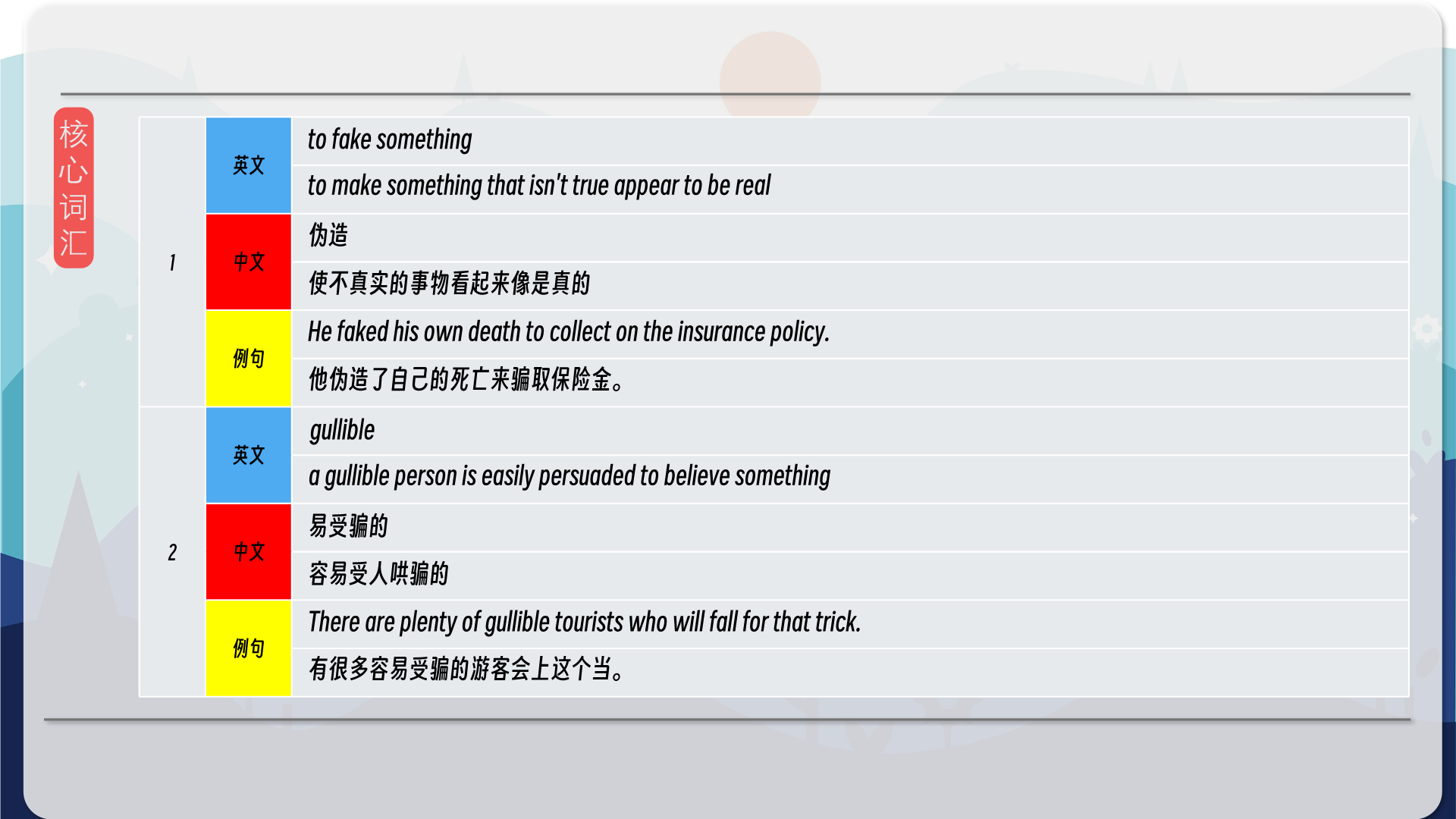
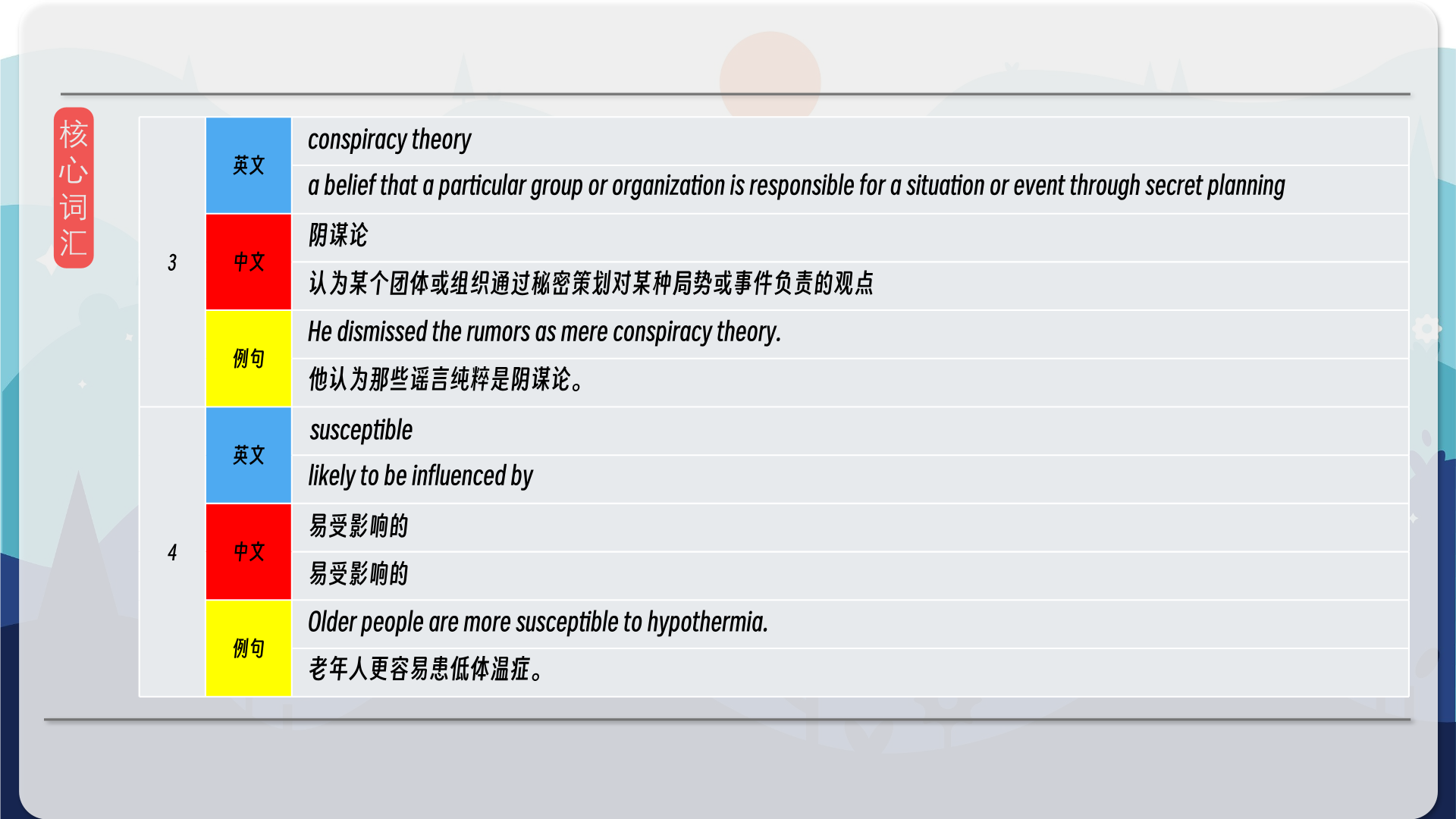
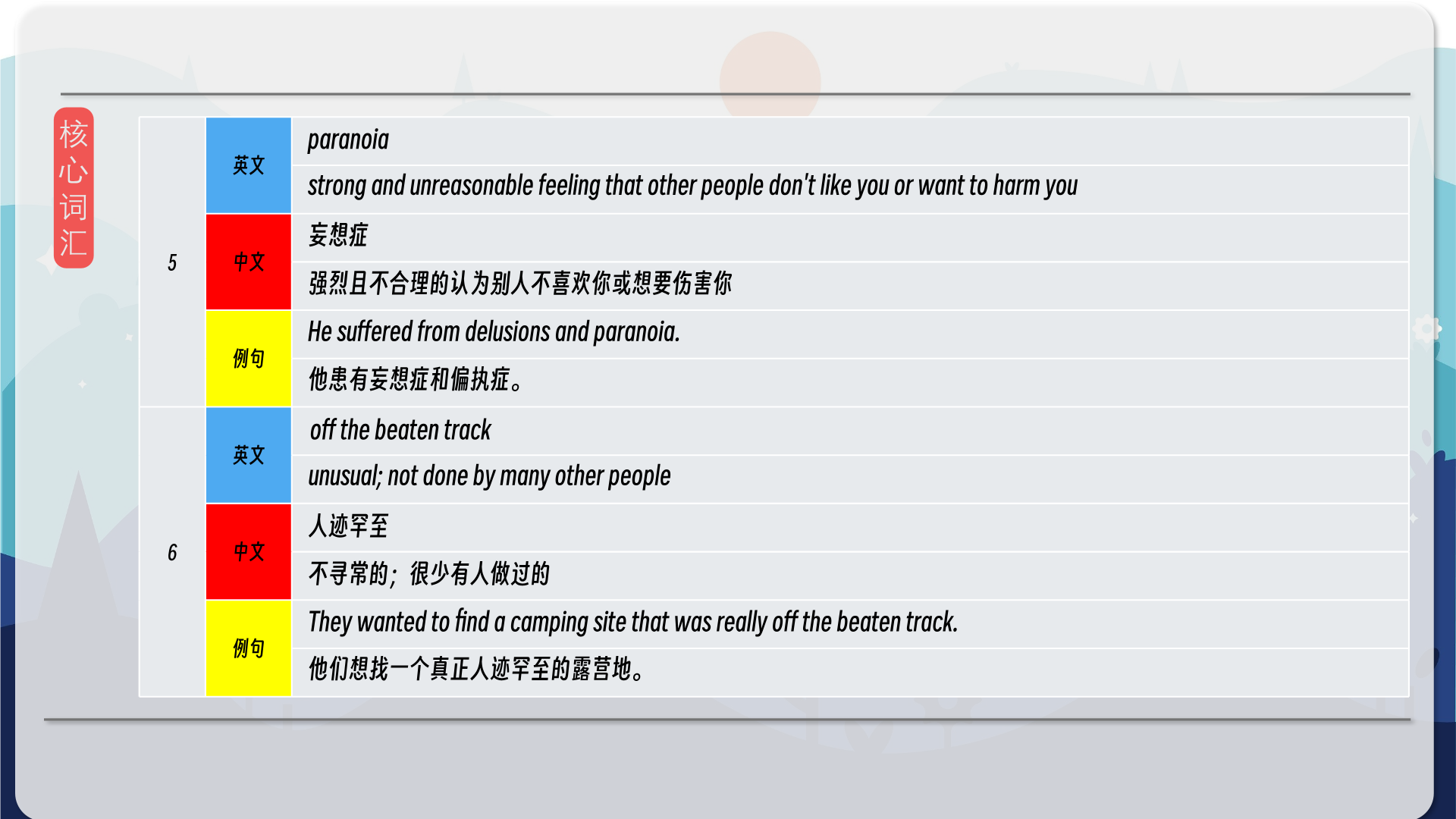
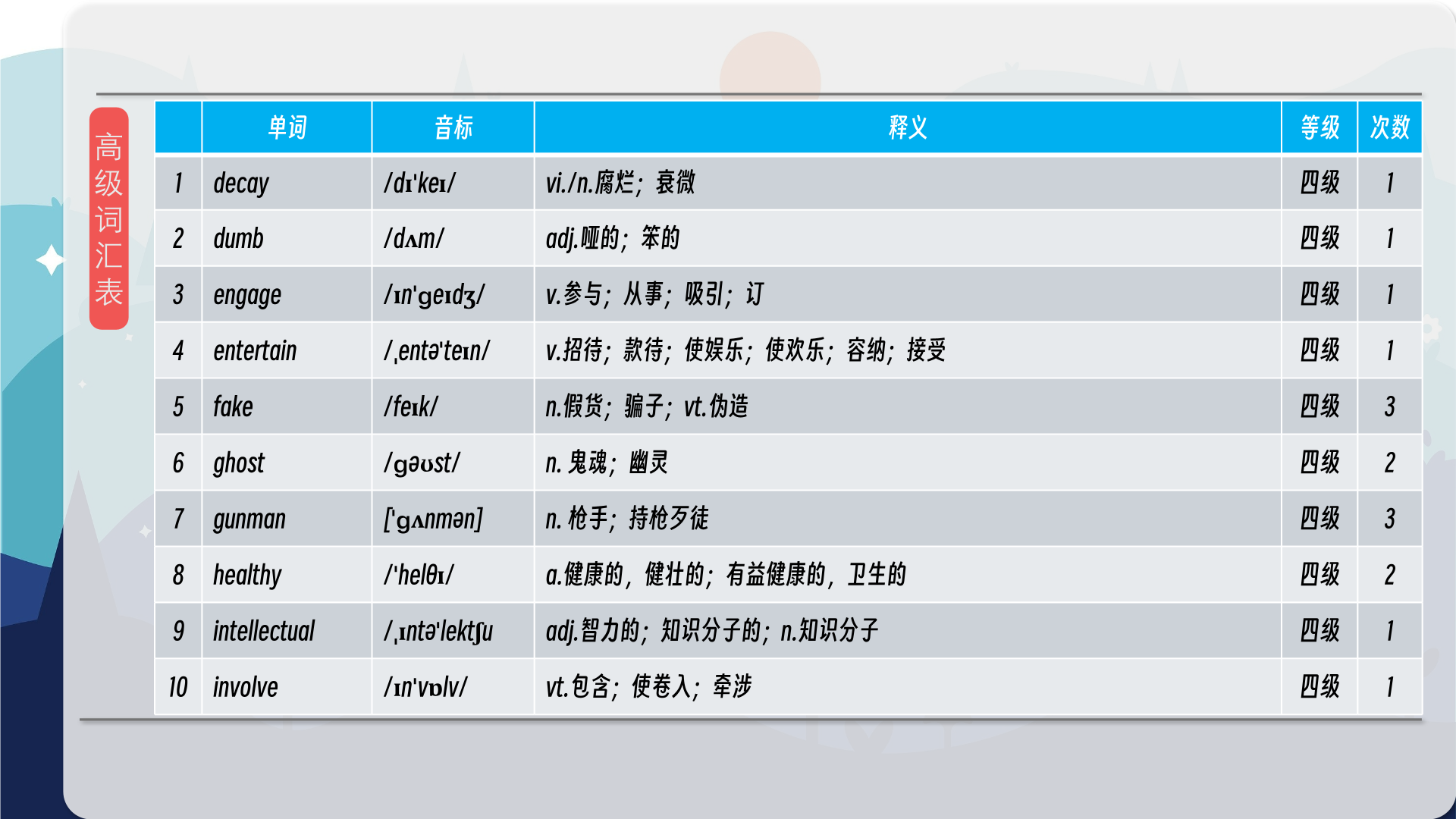
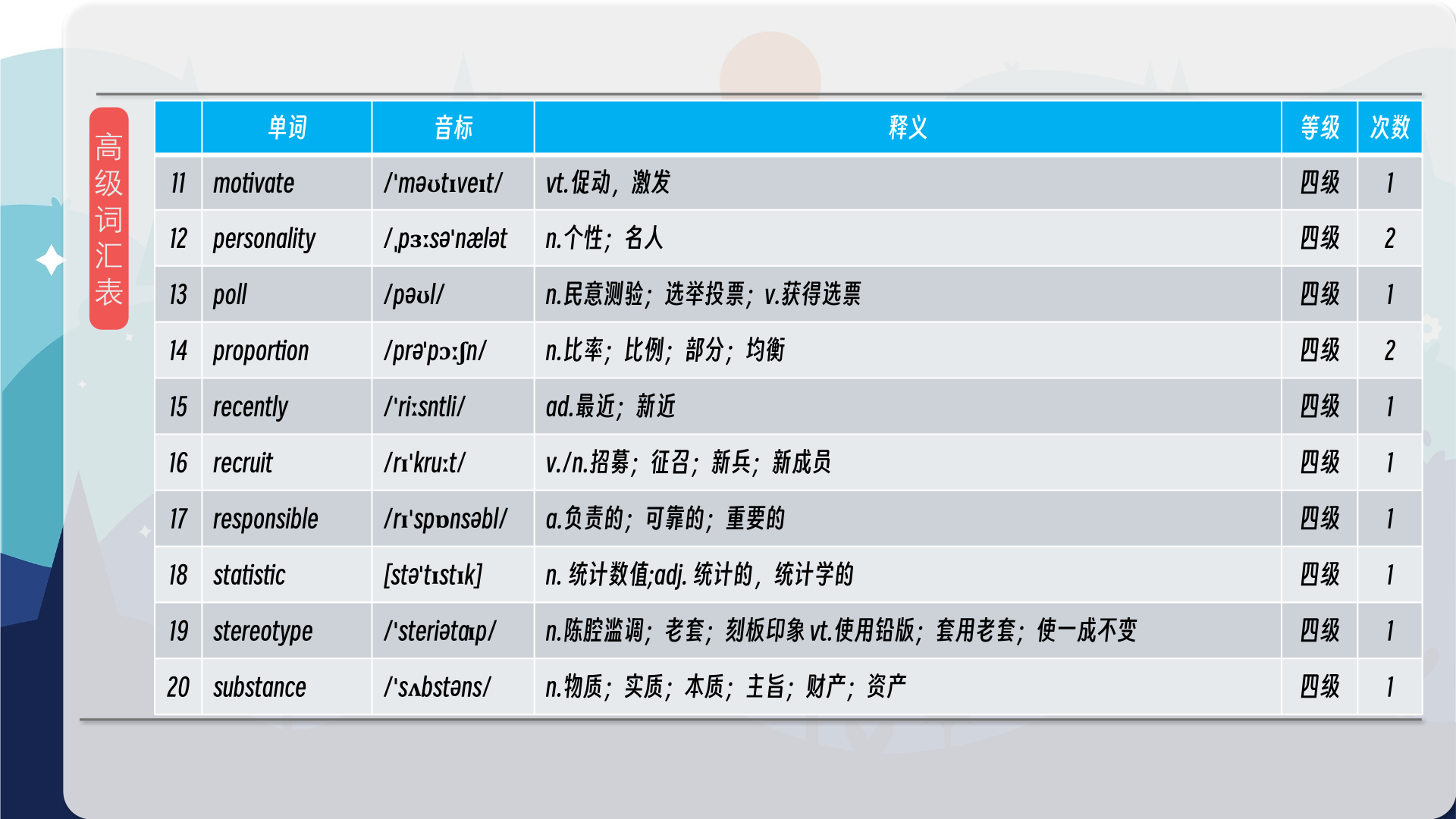
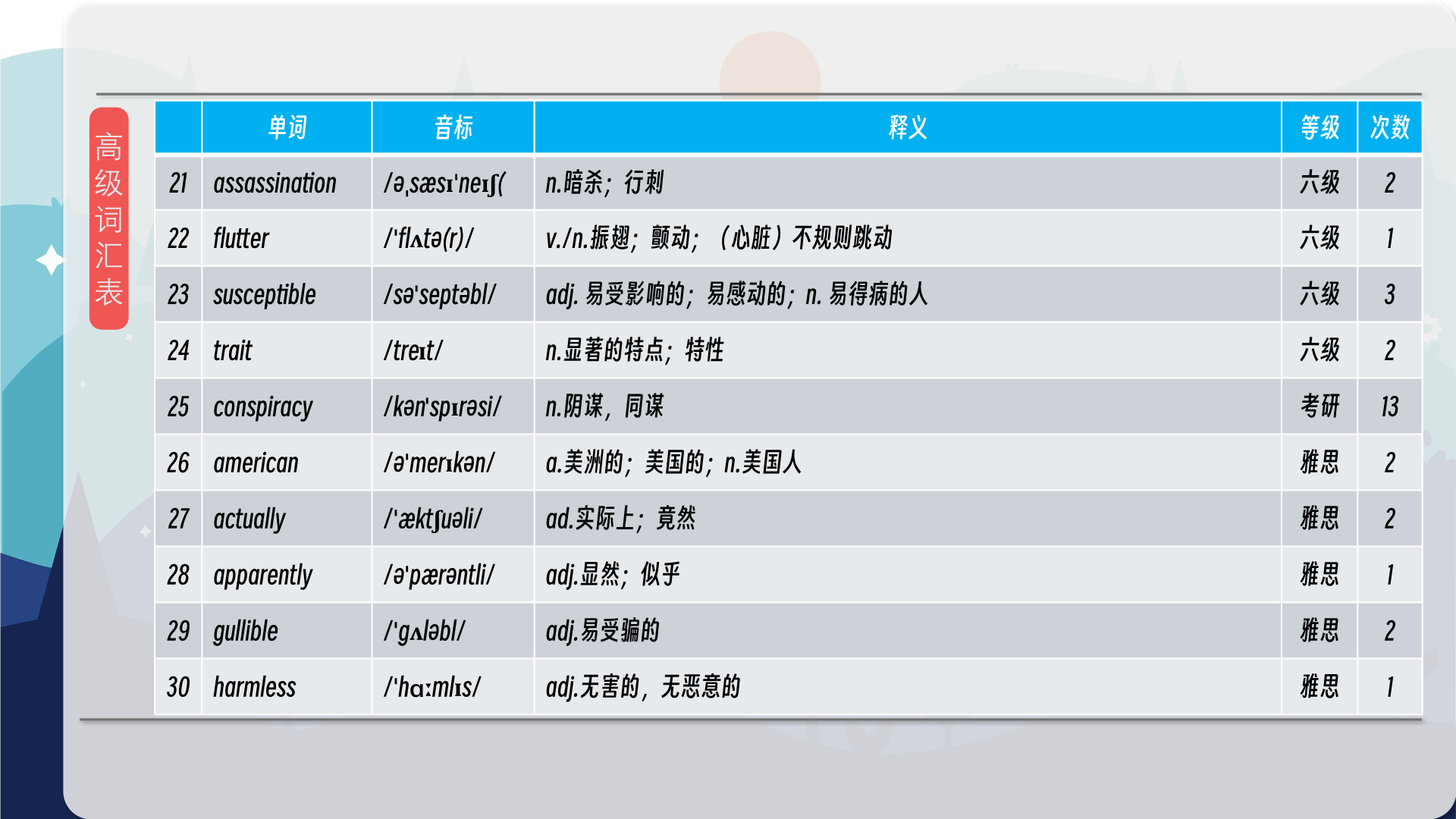
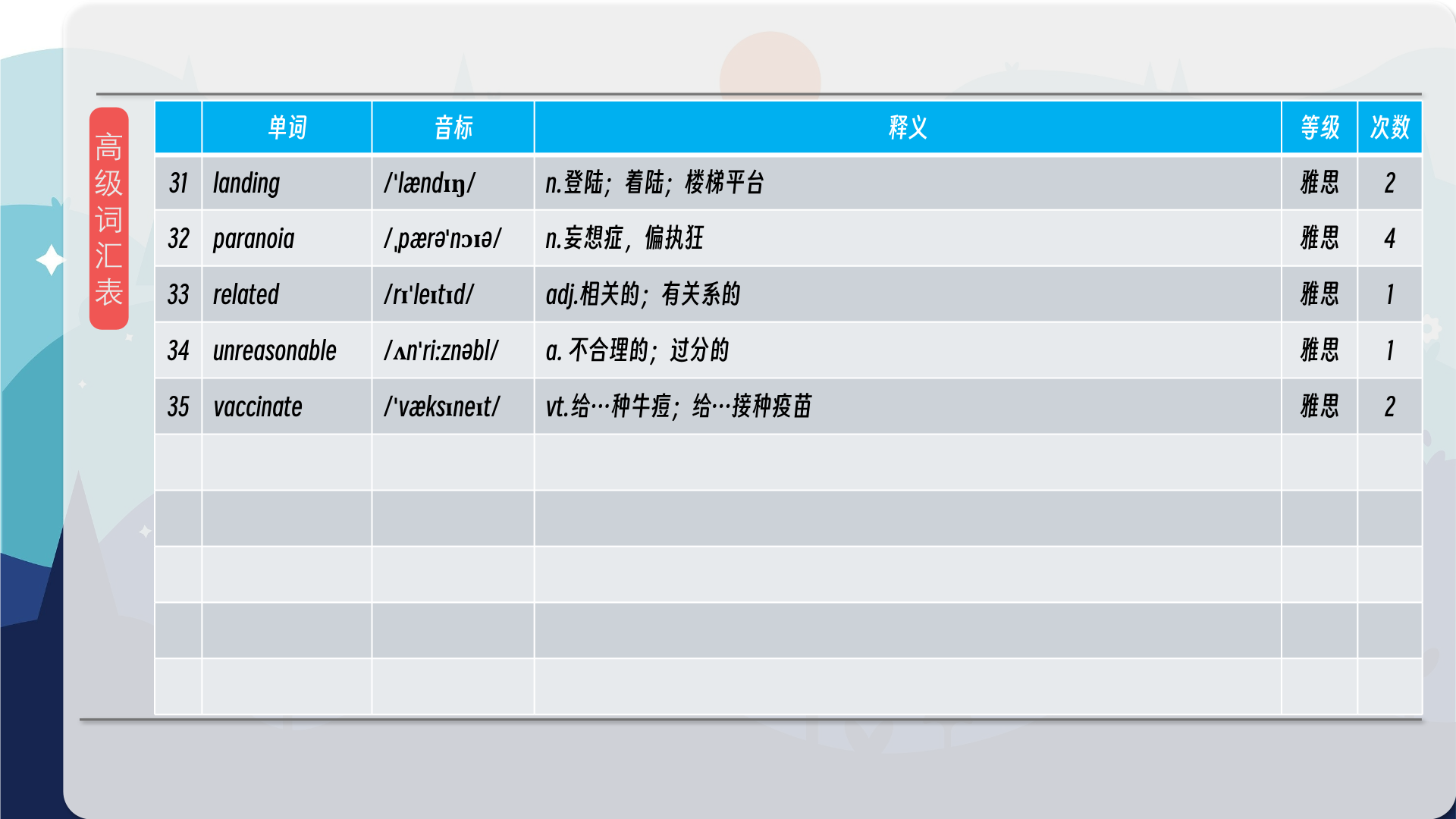

【核心词汇】
to fake something
to make something that isn’t true appear to be real
伪造
使不真实的事物看起来像是真的
He faked his own death to collect on the insurance policy.
他伪造了自己的死亡来骗取保险金。
gullible
a gullible person is easily persuaded to believe something
易受骗的
容易受人哄骗的
There are plenty of gullible tourists who will fall for that trick.
有很多容易受骗的游客会上这个当。
conspiracy theory
a belief that a particular group or organization is responsible for a situation or event through secret planning
阴谋论
认为某个团体或组织通过秘密策划对某种局势或事件负责的观点
He dismissed the rumors as mere conspiracy theory.
他认为那些谣言纯粹是阴谋论。
susceptible
likely to be influenced by
易受影响的
易受影响的
Older people are more susceptible to hypothermia.
老年人更容易患低体温症。
paranoia
strong and unreasonable feeling that other people don’t like you or want to harm you
妄想症
强烈且不合理的认为别人不喜欢你或想要伤害你
He suffered from delusions and paranoia.
他患有妄想症和偏执症。
off the beaten track
unusual; not done by many other people
人迹罕至
不寻常的;很少有人做过的
They wanted to find a camping site that was really off the beaten track.
他们想找一个真正人迹罕至的露营地。
在公众号里输入6位数字,获取【对话音频、英文文本、中文翻译、核心词汇和高级词汇表】电子档,6位数字【暗号】在文章的最后一张图片,如【220728】,表示22年7月28日这一期。公众号没有的文章说明还没有制作相关资料。年度合集在B站【六分钟英语】工房获取,每年共计300+文档,感谢支持!